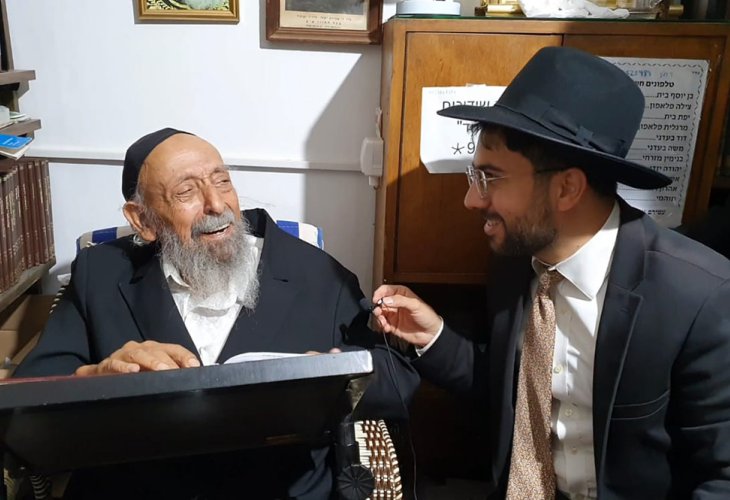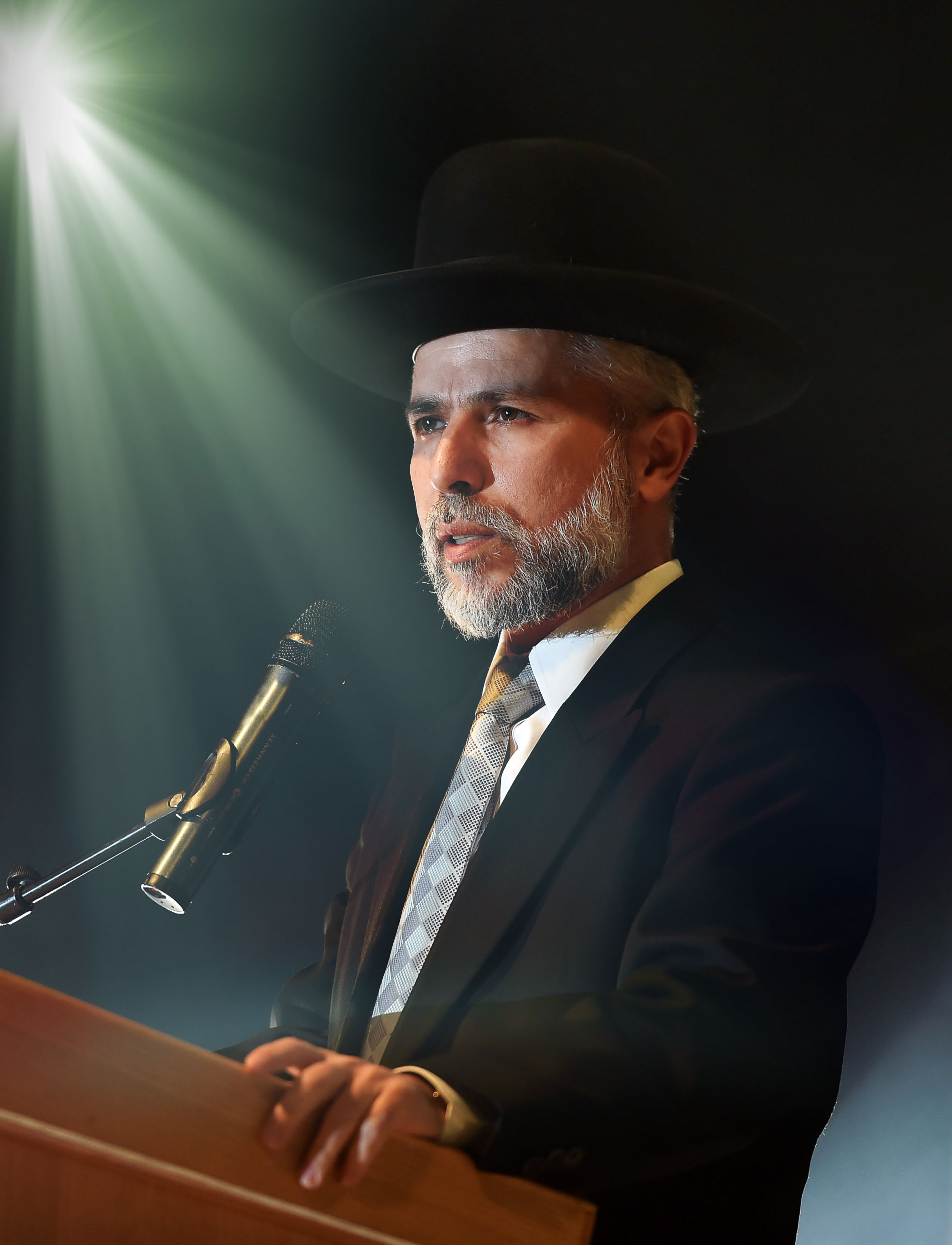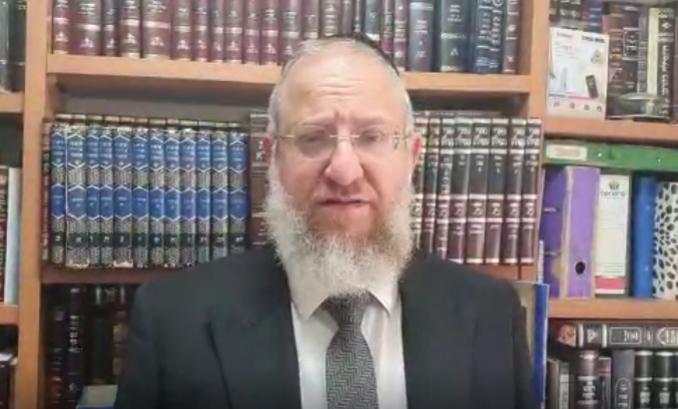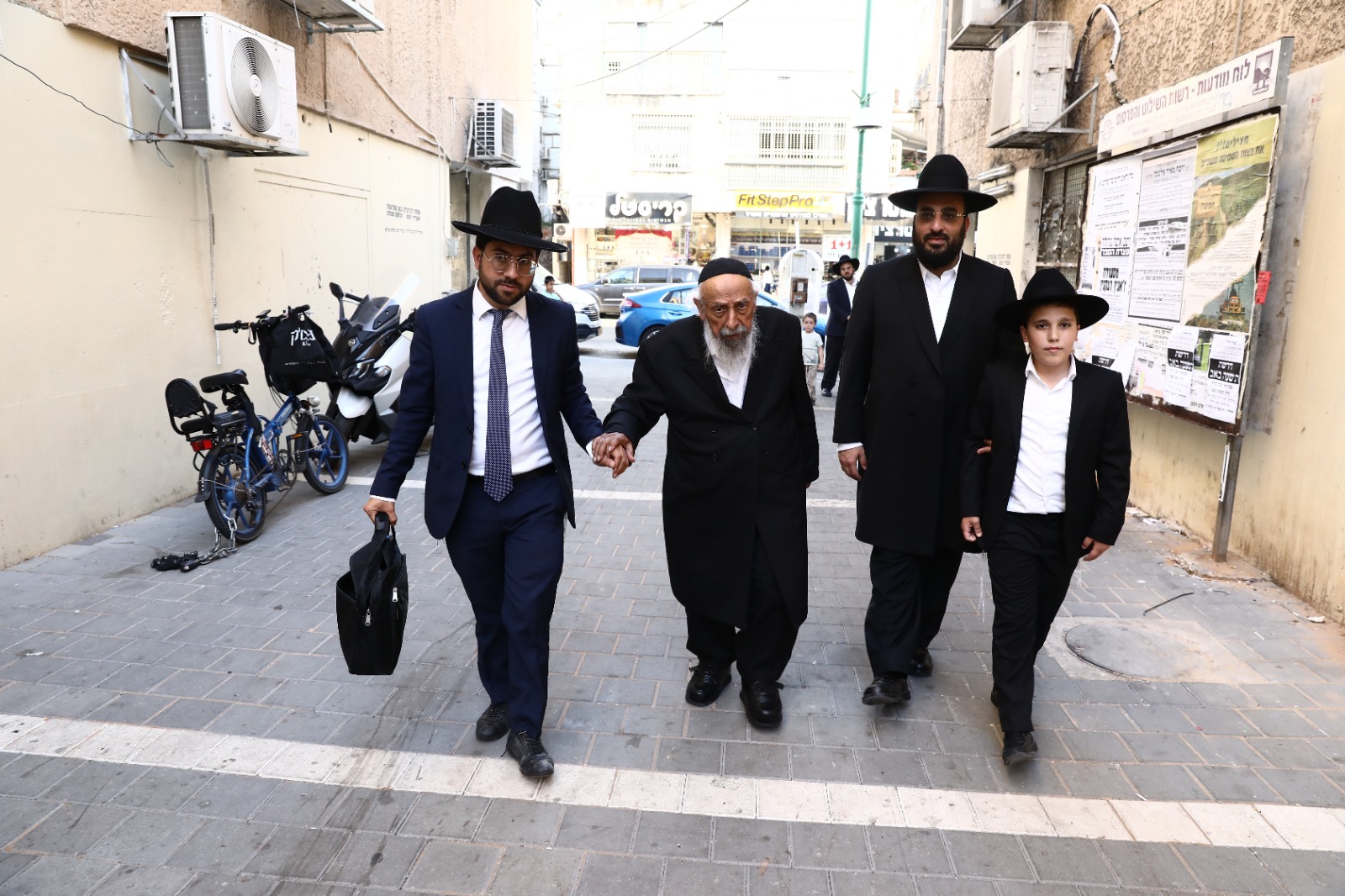"The Only Time Rabbi Badani Was Angry with Me"
Rabbis from the Hidabroot organization fondly recall the unique character of Rabbi Shimon Badani zt"l, his guidance to the organization, his halachic rulings, and the situation where he expressed his displeasure.
 Rabbi Badani smiling: "You're explaining to me what Hidabroot is? You made me laugh." (Photo: Yaakov Cohen)
Rabbi Badani smiling: "You're explaining to me what Hidabroot is? You made me laugh." (Photo: Yaakov Cohen)On the eve of last Sukkot, Rabbi Yehuda Chazan, a close associate of Israel's great rabbinical leaders and an emissary of "Hidabroot," came to the residence of Rabbi Shimon Badani zt"l to bring him a set of four beautiful species. "The rabbi was very weak then," Rabbi Chazan notes, "It was exactly a day before he was hospitalized, yet one could still see the great light in his eyes. He examined the lulav and etrog and declared: 'This I will shake.' His grandson wanted to introduce me to him and said: 'The rabbi is from Hidabroot, an organization of bringing people closer...'. Then the rabbi simply burst out laughing and said to him: 'You made me laugh, you're telling me what Hidabroot is? I know them well and know how devoted they are...'. This image of the rabbi laughing is what I carry with me to this day, occasionally glancing at it for strength. Especially now, during the days of mourning after his passing. We are left so lonely, with a huge void that's hard to fill. But this picture reminds me of Rabbi Badani, who led the organization over the years and gave so much advice and direction. His words will continue to accompany us in the future. These things are etched in us, there's no other way."
Like a Simple Scholar
Rabbi Yaron Ashkenazi, a member of the spiritual board at Hidabroot and head of the halacha line, also fondly remembers the many conversations he had with Rabbi Badani over the years of the organization's activity.
"The connection with Rabbi Badani lasted many years," Rabbi Ashkenazi recounts. "It began in the early days of the channel, as Rabbi Badani was one of the two rabbis who directed us. Together with Chacham Shalom Cohen zt"l, he provided his advice on every question that arose, including the most essential matters. The organization always followed their instructions."
"What was special about Rabbi Badani was his true humility," Rabbi Ashkenazi recalls longingly. "Many spoke of this after his passing, but I really saw it up close, because I often needed to consult with him. Every time, I didn't need an appointment with attendants or gabbaim; I would simply come to the kollel. Despite being a great leader, he sat and learned in the kollel like a regular scholar for two full sessions. I always knew I could come at 1:10 PM, after the morning session, to ask and consult, and if I couldn't manage, then I would come at the end of the second session. Every time, the rabbi would graciously find time, uniquely strengthening and praising Hidabroot and Rabbi Zamir in an extraordinary way. He would ask: 'How is Rabbi Zamir? How is he? Please tell him I said he should continue and Hashem will strengthen him,' and other similar blessings."

Rabbi Chazan also remembers similar statements. "Rabbi Badani repeatedly mentioned that Hidabroot is an organization involved in outreach, and therefore, it will bring about redemption," he recalls. "He had a regular statement he used to say: 'One must know how to understand in outreach,' and always, on related topics, he recommended and sent people to us. Additionally, he came several times to the Hidabroot house especially to strengthen and announced: 'Because of you, Mashiach will come.' When I invited him to various events, he would always try to attend and participate, truly seeing it as a mission. A few months ago, the daughter of Hidabroot's CEO got married. It was already a period when he rarely left his house, but when I came that evening to inquire if he was coming to the wedding, he stood up in his housecoat and said: 'If it's someone involved in spreading Torah, then I'm coming out for him,' and so he went to the wedding, still in his housecoat."
"On another occasion, I arrived at his house and rang the bell, but since no one opened, I called the house phone and the rabbi himself answered the call. I introduced myself and told him I came to discuss matters concerning Hidabroot. The rabbi replied: 'Come in.' When I entered, I saw he was sitting in his room with a doctor treating his leg. It seemed like the least appropriate situation to receive people, but because Hidabroot meant so much to him, he told me to enter and we had the conversation."
"You Will Bring Redemption"
"The rabbi was the great of the generation, yet did everything with immense simplicity," clarifies Rabbi Chazan. "For instance, it was possible to see him arriving at the kollel every morning, simply taking off his jacket and hat and sitting to learn like any other scholar, not seeking to stand out. One day he got up to take something just as someone entered the kollel who didn't recognize him. This person approached him and asked: 'Do you perhaps know the dollar rate?' Rabbi Badani paused, thought for a moment, then said: 'I honestly don't know, but let's find another scholar, perhaps he can help you.'"
Rabbi Ashkenazi notes that he himself was greatly strengthened by witnessing the inseparable connection between Rabbi Badani and the kollel where he studied. "During the coronavirus period, a video was published where he was seen standing outside the kollel, holding onto the walls from the outside and weeping bitterly, crying out: 'Master of the Universe, you closed our houses of study because we didn't honor them as we should. Please open our houses of study, and I promise to honor them...'. It was moving. In general, everything that mattered to him in life was to do Hashem's will, and that touched every field and matter. Every time I came to talk to him and presented a question, he would immediately ask: 'What is Hashem's will?' And if he concluded that Hashem demanded something specific, he would instruct to do that, without hesitation or error, because 'if that's what's needed, then that's what we do.'"
 Rabbi Yaron Ashkenazi
Rabbi Yaron Ashkenazi"A few years ago, there was a period when a certain attack was raging against certain projects initiated by the Hidabroot organization, including the 'Tzofia' project—a kind of television intended for strengthening and includes strengthening content only in the spirit of Judaism. There were claims heard in the street that Hidabroot was causing people to bring televisions into their homes. Of course, 'Tzofia' was not intended at all for people who originally did not have a television in their home, but only for those drawing closer."
"We brought the system to Rabbi Badani, showed it to him up close, and explained that it was intended for the strengthening public, and asked him if it was right to market this product under supervision or if there was a fear people would be tempted to buy bad televisions. After he understood exactly what it was, he said: 'Certainly, not only is it permitted, but it's a mitzvah and a public merit.' In those days, Rabbi Badani stood up to the criticism with full force and informed anyone who approached him: 'I approved it, I'm standing behind it.' A gathering was also held to strengthen the CEO, and Rabbi Badani took part in it, announcing to the CEO and Rabbi Zamir Cohen: 'You will bring the redemption.'"
"The Rabbi is Angry with You"
Rabbi Yehuda Chazan had the personal blessing of being close to Rabbi Badani since he was a young man. "As a yeshiva student, I have an unforgettable memory of him," he reveals. "It was when I came home for a free Shabbat, and on Sunday morning before returning to yeshiva, I came to the kollel for the rabbi to bless me. I was blessed, and then the rabbi inquired: 'When are you traveling to yeshiva?' I answered that I would leave soon. A few minutes later, another person came to be blessed, and the rabbi remembered that he lived in Jerusalem, so he asked him: 'Are you going home?' When he answered in the affirmative, he asked: 'Can you take a yeshiva boy with you?' hinting at me. I remember how it moved me. Just a young boy, and yet the rabbi cared for me so much.
 (Photo: Yaakov Cohen)
(Photo: Yaakov Cohen)"Throughout all the years, I remember one time he was angry with me. It was a few years ago when I came to the kollel while Rabbi Badani was in the middle of delivering a lesson. When I entered, everyone rushed to me and said: 'Here is the rabbi, he's here,' and then someone whispered to me: 'The rabbi is very angry with you.' I was really scared, I didn't understand why. After the lesson, I approached the rabbi, and he asked me: 'What are the nonsense you wrote about me in the newsletter?' referring to the article published about him in the Hidabroot newsletter that Shabbat. When I answered: 'But it's true,' he was really uncomfortable, and then he added: 'Don't write anything about me.' He was so modest, and it really bothered him that stories about him were being written and told.
"His modesty and simplicity also meant he couldn't bear any special honors around him. I remember coming with him once to the Western Wall, and together with a few companions, we tried to clear a path through the crowd so the rabbi could pass. He stopped us immediately and declared: 'If you continue, I'll go back.'"
"After Rabbi Badani's passing, a huge void has been created," Rabbi Ashkenazi concludes. "Over the years, we brought many essential questions about the organization's activities before him. I am prevented from detailing them, because they were private decisions about the organization and its way of functioning, and these are not matters that can be universally applied to other topics, but for us, he was the guiding fire before the camp. He really led us and showed us the way. Now, after his passing, I feel that we are truly orphans, especially since in the past year, we also unfortunately lost Chacham Shalom Cohen, who was also a guiding light for us. Personally, it pains me that our children will not get to know these spiritual giants and leaders of our generation—these rabbis who walked among us and seemed simple yet were giants of spirit."

